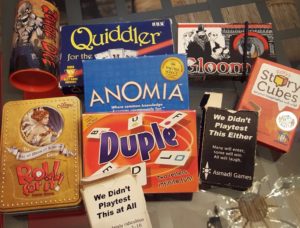Tabletop Games

What?
Saturday April 30th 2016 was International Tabletop (board game) day. I hope you grabbed your friends and family and spent the day playing your old favourites, or trying your hand at something new.
Tabletop day is a relatively new ‘holiday’ that celebrated its’ third year of existence this past April. It was first celebrated on March 30th 2013 and was live streamed on Geek and Sundry (a popular Youtube channel). I had first heard of it while watching Wil Wheaton’s Geek and Sundry show Tabletop 2 years ago, however this past was my first year being able to participate. I spent the day with my siblings and friends at my sister’s house, playing a variety of games including Pandemic, Epic Spell Wars and Munchkin (Adventure Time edition).
Yes, I know this isn’t a ‘real’ holiday, but it is fun and it is gaming, so I am all in.
So why am writing about how I spent a made up holiday over 4 months ago? Because I miss my class, and as a classroom teacher I played many board games with my students. One of the drawbacks of being in a centrally assigned teaching role means that I don’t have a class of my own; and while I love my job, I am still a classroom teacher at heart.
So What?
I wish I could hold a school/class based tabletop day. There are so many great off the shelf, and simple to make games that are fun, and that fit easily into the curriculum, without sucking the complete joy of play. I made a post about a few of these games on my gaming blog a while ago. There are a lot of edutainment tabletop games out there, but I still find that the ones designed purely for fun are the best.
Thinking about adding games to your class this September? Here are some quick FUN games that have worked for me in the classroom. (To those of you who stopped to look at the link for my gaming blog I am about to repeat myself a bit here).
Spot it, Duple, Anomia, Quiddler, Story Cubes (in its’ many incarnations), We Haven’t Play Tested this Game, all work well with language (in varying grade levels for different purposes eg. word study, vocabulary building reading for a purpose, organizing ideas…). These are games that my students even enjoyed playing in centres, on rain days or borrowing at lunch. In Language centres, for example, I have had students play Story Cubes as a warm up to creative writing. Students would play a few rounds of the game and then engage in a quick write that could use some, or none of the ideas that came out of their group play. It is also great for oral language, and drama.
There are a lot of dice games out there that you could use with students to begin or continue conversations about probability. Easy to make games include Tenzi. All you need to do is buy 6 sided dice from a dollar store, or local game store and you are all set. My students have played this game the ‘traditional’ way, as well as making their own rules. I also have Roll for It which I have played with 6 year olds, but would love to play with students in junior grades. Imagine the discussion after playing some of these dice games around strategy and the likelihood of certain outcomes (theoretical vs experimental probability). What would math journal reflections be after unpacking the game mechanics?* Also, card games can lead to good probability discussion. I has also recently fell in love with Love Letters, which has led to some interesting conversations with friends about counting cards and logical reasoning.
Now What?
How about planning and hosting a class based International Tabletop day? Or using play as a homework prompt: play a game (any game) with someone in your family or friends and write a reflection. What did you talk about? Who won, or who won the most often? How did you feel during the game?
OR
Just have them play.
“The play’s the thing…” ~Shakespeare (I know; that’s not what Hamlet meant, just go with it.) Whether you are in kindergarten or grade 6 play is important.
*I also have the game Zombie Dice, but have talked to many of my colleagues about the appropriateness of bringing it into a junior classroom. It is a great probability dice game, but might be better in an intermediate/senior class.
Leave a Reply